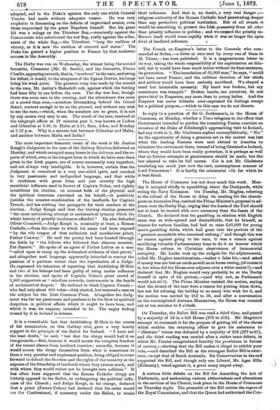The most important domestic event of the week is Mr.
Justice Keogh's Judgment in the case of the Galway Election delivered on Monday, and which occupied many hours in the delivery, and the re- ports of which, even in the longest form in which we have seen them given in the Irish papers, are of course necessarily very imperfect, and not always very intelligible. It is, however, certain that the Judgment is conceived in a very one-sided spirit, and couched in very passionate and Undignified language, and that while it condemns with great force and just severity the high sacerdotal influence used in favour of Captain Nolan, and rightly invalidates his election, on account both of the physical and the spiritual terrorism exercised on his behalf,—it positively justifies the counter-combination of the landlords for Captain Trench, and has nothing but panegyric for their conduct in the election. Judge Keogh said that the Galway election presented "the most astonishing attempt at ecclesiastical tyranny which the whole history of priestly intolerance afforded." He also defended Oliver Cromwell,—Judge Keogh is, nominally at least, a Roman Catholic,—from the abuse to which his name had been exposed "by the vile tongue of that audacious and mendacious priest, Father Conway." He said the gentry had been hunted through the fields by "the fellows who followed that obscene monster, Pat Barrett." He spoke of an agent of Father Loftus as a man "called upon to vamp up the debauched evidence of that priest," and altogether used language apparently intended to convey the passions of a partisan rather than the reprobation of a Judge. He expressed his intention of reporting that Archbishop M.'llale and two of his bishops had been guilty of using undue influence in the election, and spoke of Captain Nolan's great crowd of 2,800 supporters as "mindless cowards, instruments in the hands of ecclesiastical despots." He inclined to think Captain Trench— who had only about 600 votes—duly elected, but reserved a case on the subject for the Irish Common Pleas. Altogether the Judg- ment was far too passionate and partisan to be the blow at spiritual despotism in political affairs which it ought to have been, and which it was, we suppose, intended to be. The angry feeling roused by it in Ireland is intense.


































 Previous page
Previous page